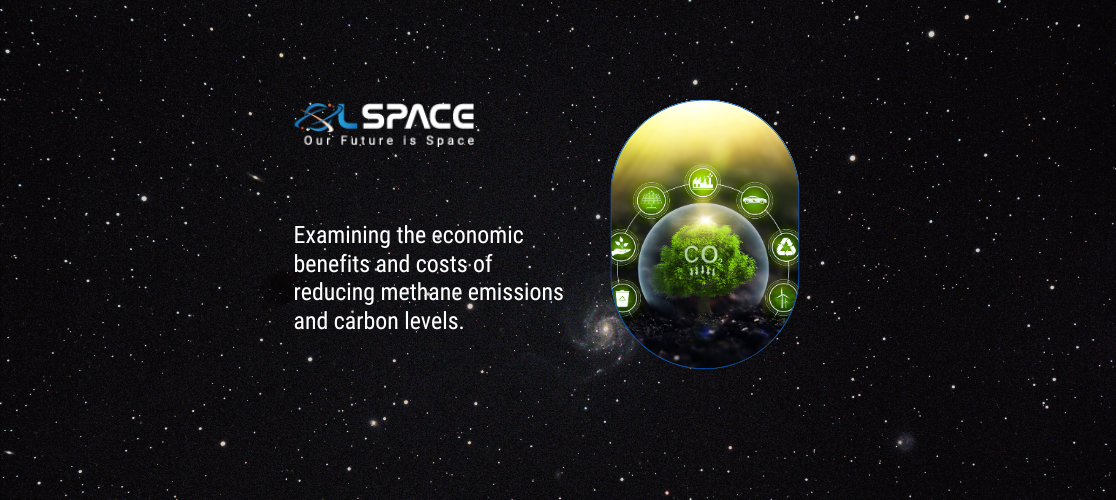15 September 2023
Examining the economic benefits and costs of reducing methane emissions and carbon levels.

Examining the economic benefits and costs of reducing methane emissions and carbon levels is crucial for understanding the potential impacts of climate change mitigation efforts.
Here’s an overview of the economic aspects of reducing methane emissions and carbon levels:
Benefits of Reducing Methane Emissions: Climate Mitigation: Methane is a potent greenhouse gas with a much higher global warming potential than carbon dioxide (CO2) over the short term. Reducing methane emissions can help slow down global warming.
Improved Public Health: Methane reduction can lead to a decrease in the emission of co-pollutants such as volatile organic compounds (VOCs) and nitrogen oxides (NOx), which contribute to air pollution and adverse health effects. Healthier populations can result in reduced healthcare costs.
Agricultural Efficiency: In the agricultural sector, capturing methane emissions from manure management systems can produce biogas, a renewable energy source. This not only reduces emissions but also generates revenue through clean energy production.
Energy Efficiency: In the energy sector, reducing methane leaks during the production and transportation of natural gas can improve the overall efficiency of energy systems.
Job Creation: The transition to cleaner energy sources and technologies, including those that reduce methane emissions, can create jobs in renewable energy, technology development, and environmental management.
Costs of Reducing Methane Emissions:
Initial Investment: Implementing methane reduction technologies and practices may require upfront investments in equipment, infrastructure, and research and development.
Operating Costs: Ongoing operational and maintenance costs are associated with methane capture and emissions reduction efforts, particularly in sectors like agriculture and waste management.
Benefits of Reducing Carbon Levels (CO2):
Climate Mitigation: Carbon dioxide is the primary driver of long-term climate change. Reducing CO2 emissions helps mitigate the impacts of global warming, including extreme weather events, sea-level rise, and disruptions to ecosystems.
Renewable Energy Transition: Investments in renewable energy sources, such as wind, solar, and hydroelectric power, can reduce carbon emissions while promoting energy independence and sustainability.
Improved Air Quality: A reduction in CO2 emissions is often accompanied by a decrease in air pollutants like particulate matter and sulfur dioxide, leading to improved air quality and public health benefits.
Innovation and Technological Advancements: Transitioning to a low-carbon economy drives innovation in clean technologies, leading to economic growth and competitiveness.
Costs of Reducing Carbon Levels (CO2):
Transition Costs: Shifting from fossil fuels to low-carbon energy sources and technologies can be costly, especially for industries heavily reliant on carbon-intensive processes.
Regulatory Compliance: Meeting carbon reduction targets may require industries to comply with stringent regulations, which can lead to compliance costs.
Economic Disruption: In some cases, carbon reduction efforts may result in economic disruption for certain sectors, particularly those heavily invested in fossil fuels.
Economic Considerations:
Cost-Benefit Analysis: To assess the economic implications of reducing methane emissions and carbon levels, comprehensive cost-benefit analyses should be conducted. These analyses weigh the costs of implementation against the long-term benefits, which include avoided damages from climate change, health improvements, and economic opportunities in clean energy and technology sectors.
Policy Instruments: Governments often use a mix of policy instruments, including carbon pricing mechanisms (carbon taxes or cap-and-trade systems), subsidies for renewable energy, and regulations to incentivise emissions reduction.
Innovation and Research: Investment in research and development of clean technologies can reduce the costs associated with emissions reduction and drive economic growth through technological advancements.
Global Collaboration: Climate change is a global issue, and international cooperation is essential. Cross-border initiatives and agreements can help distribute costs and maximise benefits.
In conclusion, while there are costs associated with reducing methane emissions and carbon levels, the long-term economic benefits, including climate mitigation, improved public health, and innovation, often outweigh the upfront and ongoing expenses. Moreover, taking proactive measures to address these emissions is crucial for minimising the economic and environmental impacts of climate change in the future.
